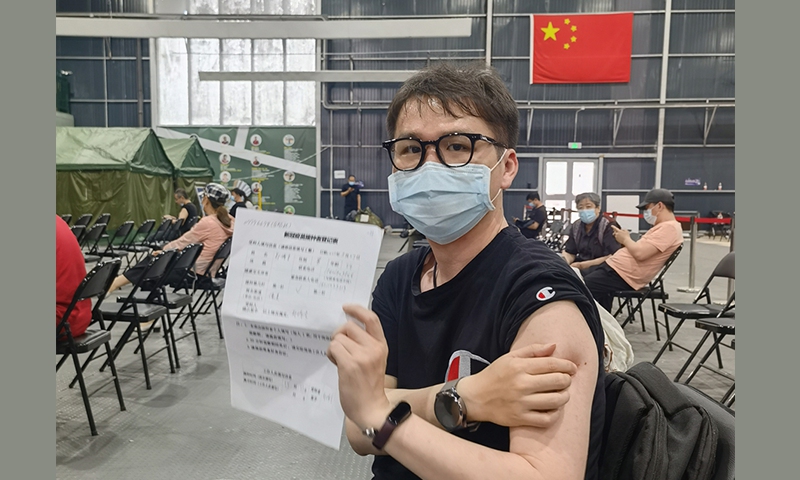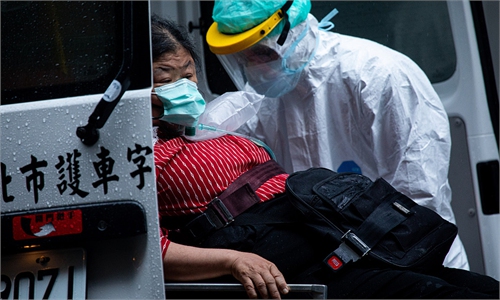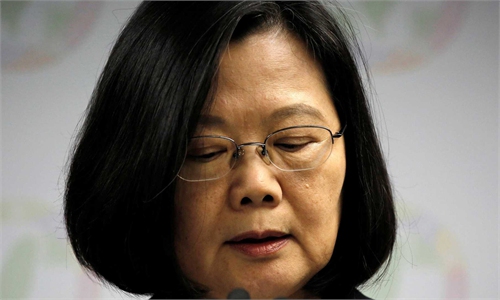More Taiwan residents come to mainland for COVID-19 shots
Doses ‘safer, more convenient’ than those offered in US

Cheng Po-yu, executive director of the cross-Straits Youth Exchange Association, takes the COVID-19 vaccine in Beijing in late May. Photo: courtesy of Cheng Po-yu
A growing number of Taiwan residents have been seen heading to Chinese mainland to get free COVID-19 doses as the island faces an acute shortage of vaccines amid rising infections.
Taiwan residents who have received vaccines in the Chinese mainland told the Global Times they believed that compared with the US, mainland COVID-19 jabs are not only more convenient, but also cost-efficient and safer.
With a surging number of coronavirus infections and a critical lack of vaccines, Taiwan people are seeking solutions elsewhere, including the mainland and the US, Xu Zhengwen, head of the Taiwan Chamber of Commerce, told the Global Times on Tuesday.
"However, more people are choosing the mainland over the US," Xu noted, as the mainland is closer and more convenient - a person can get a free dose by appointment by producing a travel permit.
From February to April, the number of Taiwan residents going to the US was around 15,000 while the number going to the mainland exceeded 48,000, said Xu. Most of these people were entrepreneurs and their families.
Xu said that many of his peers are flying to Shanghai or the neighboring city of Xiamen in East China's Fujian Province to get the COVID-19 doses, where green channels have been established for sign-ups after they complete quarantine periods.
Compared with the same period in 2020, the number of Taiwan people flying to Shanghai, including businessmen and students, has seen a great increase, Li Chongzhang, vice director of Shanghai Association of Taiwan, told Guancha.cn on Tuesday.
He noted that people who chose to come are mainly those who have assets or jobs in the mainland, or students. When Taiwan people see no chance for the situation in the island to change in the short term, going to the mainland where the vaccination process is more convenient is an option for them.
Cheng Po-yu, executive director of the cross-Straits Youth Exchange Association who took the vaccine in Beijing in late May, told the Global Times on Tuesday that he is urging his family and friends to come to the mainland after having had a pleasant experience getting vaccinated, with no adverse effects.
"The process went smoothly from making an appointment until the post-inoculation stage, as the health e-certificate was simultaneously uploaded to my smartphone."
Compared with those in the US, Cheng believed that the mainland vaccines are more mature, safer and cost-efficient.
"Sinopharm and Sinovac offer inactivated vaccines, which have proven to be more mature and have fewer side effects, while the US adopts mostly mRNA ones - a new biotechnology that may exhibit unknown risks," Cheng said.
Xu also told the Global Times that with the approval of the WHO being given to Sinopharm and Sinovac, Taiwan residents have more faith in mainland vaccines.
Cheng added that the overall effective epidemic control and prevention situation in the mainland is another factor that attracts Taiwan compatriots, as the majority will stay for a while after the inoculation, and "they would certainly choose a place where the epidemic has been put under control."
Xu Zhengwen believed that getting the jabs from the mainland could be beneficial if vaccine passports are rolled out across the Straits. For example, he said, quarantine periods may be reduced and cross-Straits exchanges may become more convenient.
Yok Mu-ming, former president of the pro-unification New Party of Taiwan, who came to Shanghai to get a vaccine on May 28, also called for people in the island to come to the mainland for vaccination.
"Those who are eligible might as well come to the mainland to get vaccinated," he told the Global Times in a previous interview.
He criticized the Democratic Progressive Party authorities for still engaging in ideological battles and using the epidemic to serve their political goals and seek "secession", when Taiwan residents most need help from the mainland.
Taiwan reported 22 deaths and 219 new cases of COVID-19 on Tuesday, meaning there have been more than 100 daily cases for 25 consecutive days.
As the local epidemic situation continues to worsen and the death toll keeps growing, Taiwan authorities on Monday announced plans to extend the Level 3 restrictions to June 28.



